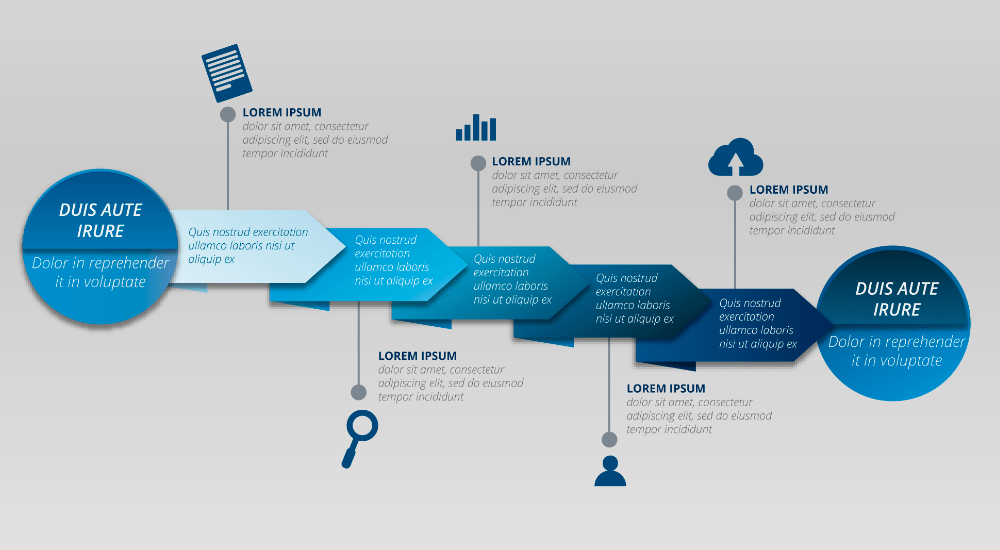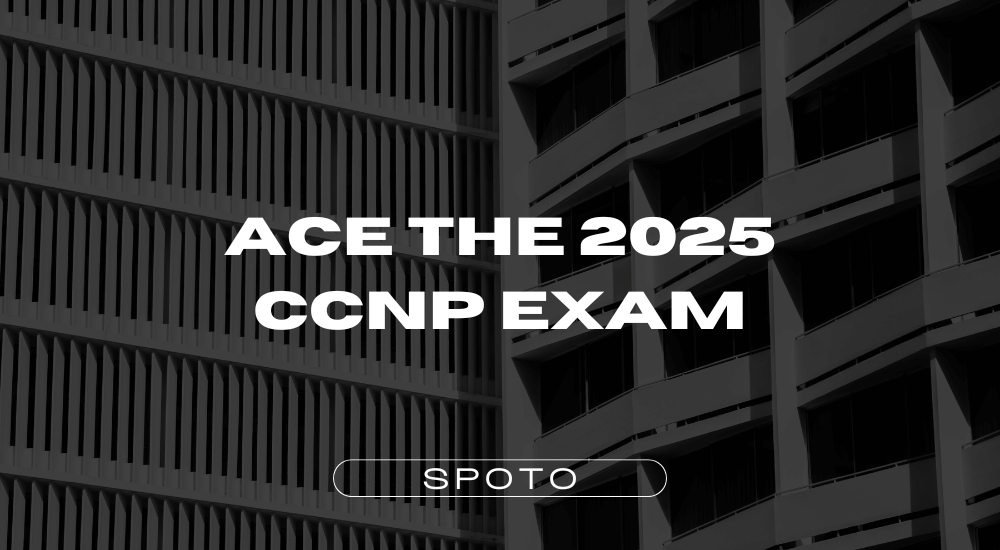TRUSTED BY THE SMARTEST TEAMS IN THE WORLD FOR CERTIFIED CANDIDATES
SPOTO Blogs
Useful learning materials to become certified IT personnel
-
- 3929
- circle
- 2025-03-10 15:30
-
- 1319
- circle
- 2025-03-05 15:45
-
- 994
- circle
- 2025-02-27 15:45
-
- 1098
- circle
- 2025-02-25 14:55
-
- 1089
- circle
- 2025-02-21 15:06
-
- 1394
- circle
- 2025-02-19 14:51
-
- 1184
- circle
- 2025-02-13 10:35
-
- 1436
- circle
- 2025-02-08 13:50
-
- 3357
- circle
- 2025-02-05 11:15
TRUSTED BY THE SMARTEST TEAMS IN THE WORLD FOR CERTIFIED CANDIDATES
SPOTO Blogs
Useful learning materials to become certified IT personnel
-
- 3929
- circle
- 2025-03-10 15:30
The Cisco Certified Network Professional (CCNP) certification has long been a valuable credential for IT professionals looking to advance their careers in networking. But as we enter 2026, with evolving technology trends, cloud dominance, and shifts in job market demands, many aspiring network engineers are asking: Is CCNP still worth it? The short answer? Yes—but with a few considerations. Let's break it down. What is the CCNP Certification? The CCNP certification is a mid-level credential offered by Cisco, designed for IT professionals who want to deepen their expertise in networking. Unlike the Cisco Certified Network Associate (CCNA), which focuses on foundational skills, CCNP validates advanced networking knowledge, including routing, switching, security, and automation. Cisco currently offers multiple CCNP tracks, including: CCNP Enterprise (routing, switching, SD-WAN, wireless) CCNP Security (firewalls, VPNs, network security) CCNP Data Center (cloud computing, storage networking) CCNP Collaboration (voice and video communication) CCNP Service Provider (ISP and telecom networking) Each track requires passing a core exam and at least one concentration exam, allowing candidates to specialize in their preferred networking domain. Why CCNP is Still Valuable in 2026 With rapid changes in IT, is investing time and money in CCNP still a good idea? Here's why it remains a worthwhile certification: 1. High Demand for Networking Professionals Despite the rise of cloud computing and automation, networking remains a fundamental IT skill. Enterprises still rely on routers, switches, firewalls, and hybrid cloud networks, creating a demand for skilled CCNP-certified professionals. 2. Better Job Opportunities and Salary Boost Many employers prioritize candidates with professional certifications like CCNP. It qualifies you for roles such as: Network Engineer Security Engineer Systems Administrator Cloud Network Engineer IT Infrastructure Specialist According to job market trends, CCNP-certified professionals can earn 15-25% more than their non-certified counterparts, with average salaries ranging from $90,000 to $130,000 per year, depending on specialization and experience. 3. A Stepping Stone to Advanced Certifications If your goal is to achieve CCIE (Cisco Certified Internetwork Expert) status, CCNP serves as an essential milestone. It provides the necessary foundation to tackle expert-level networking concepts and exams. 4. Covers In-Demand Skills (Automation & Security) In 2026, networking is not just about configuring devices; automation, cloud integration, and cybersecurity play crucial roles. Cisco has updated CCNP tracks to include Python scripting, network automation, and SD-WAN, ensuring candidates gain relevant, future-proof skills. Potential Drawbacks of Pursuing CCNP in 2026 While CCNP holds significant value, it's essential to consider these factors before committing: 1. Time and Cost Investment Exam fees: $400 for core + $300 for each concentration Study materials, courses, and lab equipment can add up to $1000 - $2500 Preparation time: 3-6 months, depending on experience 2. Shift Towards Cloud and DevOps Networking roles are evolving, with companies adopting cloud-based solutions (AWS, Azure) and automation tools. Some professionals may benefit more from certifications like AWS Certified Networking – Specialty or Google Cloud Networking Engineer instead of CCNP. 3. Employer-Specific Requirements Not all companies require a CCNP for networking roles. Some prioritize hands-on experience or vendor-neutral certifications like CompTIA Network+ or Juniper JNCIP over vendor-specific Cisco certifications. Who Should Pursue CCNP in 2026? CCNP is a great choice if you: Have CCNA-level knowledge and want to specialize further Plan to work in roles requiring Cisco network infrastructure skills Want to increase your earning potential and job opportunities Aim for higher-level certifications like CCIE Are interested in network security, SD-WAN, or automation However, if you're more focused on cloud networking, DevOps, or vendor-neutral skills, consider supplementing CCNP with AWS, Azure, or automation-focused certifications. Final Verdict: Is CCNP Worth It in 2026? Yes, CCNP remains a strong certification in 2026, especially for networking professionals looking to advance in traditional and hybrid IT environments. However, it's essential to complement it with skills in cloud networking, automation, and security to stay competitive. By strategically combining CCNP with emerging tech skills, you can future-proof your career and maximize the value of your certification. -
- 1319
- circle
- 2025-03-05 15:45
Table of ContentsFactors Affecting Study DurationRecommended Study Duration Based on ExperienceStudy Strategies for CCNP SuccessConclusion The Cisco Certified Network Professional (CCNP) certification is a valuable credential for IT professionals looking to advance their networking careers. However, one of the most common questions among candidates is: How long should I study to pass the CCNP exam? The answer depends on various factors, including prior experience, study methods, and available preparation time. This article explores the ideal study duration for IT professionals based on different experience levels, the best study strategies, and tips to ensure exam success. Factors Affecting Study Duration The amount of time required to prepare for the CCNP exam varies based on several key factors: Prior Networking Experience – Candidates with hands-on experience in networking may require less study time compared to those new to Cisco technologies. Familiarity with Cisco Devices and Concepts – A strong foundation in Cisco networking, including CCNA-level knowledge, can reduce the preparation period. Study Schedule and Commitment – The number of study hours per day or week significantly affects the total preparation time. Learning Style – Self-paced learners may take longer than those following structured training programs. Resources Used – The effectiveness of study materials, such as books, labs, and practice exams, plays a crucial role in preparation. Recommended Study Duration Based on Experience 1. Beginners (Little to No Networking Experience) Estimated Study Time: 6–9 months If you are new to networking, a longer preparation period is necessary to build fundamental knowledge before diving into CCNP concepts. Recommended steps: Start with CCNA-level materials for a solid networking foundation. Allocate at least 10–15 hours per week to study. Use hands-on labs to gain practical experience. 2. IT Professionals with Basic Networking Knowledge Estimated Study Time: 4–6 months Those with some networking background but without CCNP-level experience should spend a moderate amount of time preparing. Recommended steps: Focus on CCNP topics while reinforcing CCNA concepts. Study 8–12 hours per week, including lab practice. Take practice exams to identify weak areas. 3. Experienced Network Engineers Estimated Study Time: 2–4 months Professionals with hands-on networking experience may need less time for preparation. Recommended steps: Allocate 6–10 hours per week for revision and lab work. Focus on complex CCNP topics and real-world implementation. Use advanced study guides and scenario-based labs. Study Strategies for CCNP Success Follow a Structured Study Plan – Set clear goals and break down topics into manageable sections. Use Official Cisco Resources – Utilize Cisco's official training materials, documentation, and whitepapers. Get Hands-on Practice – Use labs, simulators, or real hardware to reinforce theoretical knowledge. Join Online Communities – Engage in study groups, forums, and discussions to learn from others. Take Practice Exams – Regularly test your knowledge with mock exams to track progress. Stay Consistent – Studying consistently over time is more effective than last-minute cramming. Conclusion The ideal study duration for the CCNP exam varies based on experience level, study habits, and available resources. Beginners should aim for 6–9 months, while experienced professionals may require only 2–4 months of preparation. By following a structured plan, practicing hands-on labs, and using the right study materials, IT professionals can efficiently prepare for and pass the CCNP exam, taking their networking careers to the next level. -
- 994
- circle
- 2025-02-27 15:45
The CCNP (Cisco Certified Network Professional) certification is one of the most sought-after credentials in the world of networking. Achieving CCNP status means you have advanced knowledge and networking skills, often making you a highly valuable asset to any IT team. Whether you're aiming to upgrade your career or deepen your expertise, the CCNP certification can open doors to higher-paying roles and more complex projects. But, for many aspiring network professionals, the road to CCNP can feel intimidating, especially for those just starting out. So, where do you begin? This guide will take you through the essential steps to help you navigate the journey from beginner to CCNP certified professional—whether you're already in the field or thinking about diving in. Start with a Solid Foundation: Get Your CCNA First Before you embark on your CCNP journey, it's important to build a strong networking foundation. Cisco recommends having the CCNA (Cisco Certified Network Associate) certification as a prerequisite for the CCNP exam. While it's technically possible to attempt the CCNP without a CCNA, having that fundamental knowledge ensures you understand core concepts like: IP addressing Subnetting Routing protocols (OSPF, EIGRP) Basic switch configuration The CCNA covers the fundamentals of networking and prepares you for more advanced topics you'll encounter in the CCNP exams, so it's crucial to start here if you're new to networking. If you're already CCNA certified, you can skip this step and jump directly into CCNP prep. Understand the CCNP Tracks and Choose Your Path Cisco's CCNP certification offers several specialized tracks, each focusing on a different aspect of networking. You need to select the one that aligns best with your career goals and interests. Here are the most popular CCNP tracks: CCNP Enterprise: Ideal for those working with enterprise networks. It covers routing, switching, and troubleshooting, along with advanced topics like SD-WAN and network automation. CCNP Security: Focuses on securing networks, including firewall configuration, VPNs, and advanced security protocols. CCNP Collaboration: Geared toward professionals working with Cisco collaboration tools like VoIP, video conferencing, and unified communications. CCNP Data Center: Tailored for professionals who want to specialize in designing, configuring, and troubleshooting data center networks and storage solutions. CCNP Service Provider: Ideal for network engineers working in service provider environments, focusing on IP networking, cloud services, and multi-protocol label switching (MPLS). Each of these tracks has its own set of exams, but they all share a common core of advanced networking knowledge, so you'll need to decide which area of expertise you want to pursue. It's important to research each track carefully to ensure you choose the one that suits your career aspirations. Get Familiar with the CCNP Exam Requirements Each CCNP track requires passing two exams: Core Exam: A broad-based exam that covers the foundational knowledge required for the track. Concentration Exam: A more specialized exam that covers advanced topics in your chosen track (e.g., SD-WAN for CCNP Enterprise or VPNs for CCNP Security). Cisco's current exam structure requires you to pass the core exam first, and then you can choose the concentration exam based on your chosen specialization. Create a Study Plan and Stick to It Becoming a CCNP requires both theoretical knowledge and practical skills, so developing a solid study plan is essential. Here's how you can approach it: 1. Review Exam Objectives Each core exam comes with a detailed exam blueprint outlining the specific topics you need to study. Start by breaking down the exam objectives and creating a study schedule that allows you to cover each topic comprehensively. 2. Hands-On Practice Networking is a hands-on field, so practical experience is key. Set up a home lab using physical equipment like routers and switches, or simulate networks using tools like GNS3 or Cisco Packet Tracer. Practice configurations, troubleshooting, and network design to reinforce your theoretical knowledge. 3. Use Quality Study Materials Cisco Press books are one of the most trusted resources for CCNP exam prep. They offer detailed coverage of exam topics and include practice questions and labs. Online courses (like those from SPOTO) provide structured video lessons that break down complex concepts. Practice exams are essential for understanding the format of the real exam and identifying weak areas in your knowledge. 4. Join a Study Group or Community Joining online forums, study groups, or communities like Reddit's CCNP subreddit or the Cisco Learning Network can help you connect with other professionals who are studying for the same exam. Sharing resources, tips, and study strategies can help keep you motivated and on track. Stay Consistent and Be Patient The CCNP certification is challenging and requires a significant time investment. Consistency is key—set aside dedicated study time every week and stick to your schedule. Some days may be tougher than others, but persistence will pay off. As you progress through your studies, remember that success doesn't happen overnight. Stay patient, celebrate small victories along the way (like passing a practice exam or mastering a tricky topic), and keep pushing forward. Prepare for the Exam Day Once you feel ready, schedule your exam! Here are a few final tips for exam day: Get a good night's sleep before the exam. Arrive early to the testing center or log in early if you're taking the exam online. Read each question carefully, and don't rush through the exam. Don't second-guess yourself—trust your preparation and instincts. Conclusion Becoming CCNP certified is a significant achievement that will open up a wealth of career opportunities in the networking field. While it may seem like a daunting journey, breaking it down into smaller, manageable steps makes it much more achievable. Start with the CCNA certification if you're a beginner, select your desired CCNP track, create a study plan, and invest in both theoretical knowledge and practical experience. Stay consistent, and you'll be well on your way to earning your CCNP and advancing your networking career. -
- 1098
- circle
- 2025-02-25 14:55
The CCNP (Cisco Certified Network Professional) certification is a significant milestone for networking professionals looking to deepen their expertise in network technologies. Unlike the entry-level CCNA, the CCNP delves into advanced networking concepts, such as routing, switching, security, and automation, requiring a higher level of skill and understanding. However, many candidates face the challenge of failing the CCNP exam, either due to a lack of preparation or incorrect study strategies. So, how can you ensure success and avoid failing your CCNP certification? In this article, we'll outline six proven strategies that will increase your chances of passing the exam with flying colors. 1. Understand the Exam Blueprint Thoroughly One of the biggest mistakes candidates make is not fully understanding the exam blueprint. Before diving into your study materials, make sure you thoroughly review the official exam topics and understand what's expected of you. Cisco provides detailed exam outlines for each CCNP track (e.g., CCNP Routing and Switching, CCNP Security, CCNP Collaboration), which include the specific topics covered and their weightage. By familiarizing yourself with the blueprint, you can tailor your study sessions to focus on the areas that are heavily tested. This also helps you avoid wasting time on irrelevant topics. For example, the CCNP Routing and Switching exam emphasizes areas like OSPF, BGP, EIGRP, and VLANs — so make sure these topics are at the top of your study list. 2. Focus on Hands-On Practice CCNP exams are practical in nature, which means they not only test your theoretical knowledge but also your ability to apply that knowledge in real-world scenarios. To be well-prepared, you need hands-on experience with Cisco routers, switches, and other networking devices. Here are some ways you can get that hands-on experience: Use Cisco Packet Tracer or GNS3 to simulate networks and practice configurations. Set up your home lab with physical or virtual equipment to experiment with real-world configurations and troubleshoot issues. Participate in online labs and practice exams, where you can apply the concepts in a controlled, exam-like environment. Hands-on practice builds confidence and reinforces theoretical learning by showing you how to solve actual network problems. 3. Create a Structured Study Plan It's easy to get overwhelmed by the breadth of material for the CCNP certification. Without a clear plan, your study sessions could become scattered and inefficient. To avoid this, create a structured study plan that outlines what to study, when to study it, and how long to spend on each topic. Your study plan should: Break down the topics into manageable sections (e.g., routing protocols, network security, troubleshooting, etc.). Set specific daily or weekly goals (e.g., finish reading about EIGRP and complete practice exercises by the end of the week). Allocate time for reviewing difficult topics and taking practice exams. A clear, structured study plan will help you stay focused and organized, ensuring that you cover all the necessary material before exam day. 4. Use High-Quality Study Materials Not all study materials are created equal. When it comes to the CCNP, you need resources that are up-to-date and align closely with the exam objectives. Consider using: Official Cisco Study Guides: These are highly recommended since they are written by Cisco experts and directly aligned with the certification exams. Books by reputable authors: Books like “CCNP Routing and Switching 300-101 Official Cert Guide” by Wendell Odom are comprehensive and provide in-depth explanations of key topics. Online Courses: Platforms like SPOTO offer expert-led video courses that explain complex topics in an easily digestible manner. Cisco Learning Network: This online resource offers a range of study materials, practice exams, and a community of professionals to discuss questions and share insights. Ensure that the materials you choose are up-to-date with the latest exam version, as Cisco regularly updates its exams to reflect new technologies and industry trends. 5. Take Practice Exams Regularly Taking practice exams is one of the most effective ways to prepare for the CCNP. Practice tests help you familiarize yourself with the exam format, assess your readiness, and identify areas where you may need additional study. Moreover, they simulate the pressure and time constraints you'll face on exam day. Take a diagnostic test before you start studying to assess your baseline knowledge. Set aside time for regular practice exams throughout your study plan. Make sure to mimic real exam conditions (e.g., time limits, no distractions). Analyze the wrong answers carefully to understand your mistakes and reinforce those weak areas. By taking practice exams, you'll get a feel for the exam and also increase your confidence when it's time to take the real test. 6. Review and Master Troubleshooting Skills Troubleshooting is a critical skill for the CCNP exams. Many of the questions will require you to diagnose network issues, identify the root causes, and implement solutions. This requires both theoretical knowledge and the ability to think critically under pressure. To master troubleshooting: Practice troubleshooting scenarios regularly using your lab setup. Understand common network issues and their resolutions for different protocols (e.g., OSPF, BGP). Read through exam-specific troubleshooting guides and learn the troubleshooting commands and methodologies (e.g., show commands, debugging tools). Take note of common network problems that arise in CCNP exams and ensure you're familiar with the troubleshooting steps required to resolve them. By practicing troubleshooting on a regular basis, you'll feel confident handling similar questions during your actual exam. Conclusion The CCNP certification is a significant milestone in your networking career, but achieving it requires both dedication and strategy. By implementing these six proven strategies — understanding the exam blueprint, gaining hands-on practice, creating a structured study plan, using high-quality materials, taking practice exams, and mastering troubleshooting — you'll be well on your way to passing the CCNP exam with confidence. Remember, the key to success in CCNP isn't just about memorizing facts; it's about understanding the concepts and knowing how to apply them in real-world scenarios. So, put in the work, and you'll not only pass the exam but become a proficient networking professional ready for the challenges of advanced networking. -
- 1089
- circle
- 2025-02-21 15:06
If you're gearing up for the CCNP (Cisco Certified Network Professional) certification, you've probably heard it's a beast. It's not just about memorizing commands; it's about truly mastering networking concepts at a professional level. But here's the thing: Is it going to take you forever to get there, or can you start feeling confident as soon as you finally nail that one tricky topic — subnetting? In this article, we'll take a lighthearted yet informative look at CCNP preparation, exploring some of the key challenges and strategies that will help you avoid feeling like it's a lifetime of struggle. After all, we know that the journey to the CCNP isn't just about the destination — it's about the skills you pick up along the way. So, let's dive into what it really takes to ace the CCNP exam and make your preparation manageable, even if you're still figuring out how to calculate a subnet. 1. The Subnetting Struggle is Real (But Not Forever) Ah, subnetting. If you're new to networking, you might think of it as that one exam question that haunts your dreams. But here's the good news: subnetting doesn't have to be the thorn in your side forever. Sure, it can be confusing at first — especially when you're trying to figure out how to break a network into smaller parts and calculate addresses for each subnet. However, once you get the hang of the process, it's no longer a roadblock but a stepping stone to mastering networking. Tips to Master Subnetting: Practice, Practice, Practice: Use online subnetting calculators to check your work and practice subnetting manually until you're comfortable. Understand the Theory: Learn about CIDR (Classless Inter-Domain Routing) notation and subnet masks — understanding the theory behind the math will make it easier to apply. Use Mnemonics: Mnemonics, like “8, 16, 24, 32,” can help you quickly remember standard subnet mask sizes. Once you've got subnetting down, it can feel like a major weight has been lifted from your shoulders, and you're finally able to focus on the more complex aspects of the CCNP. 2. The Road to CCNP: It's a Marathon, Not a Sprint CCNP preparation isn't about cramming the night before. It's a long-term commitment that requires careful planning and consistent study habits. While you don't have to study for a lifetime, you should be prepared to dedicate several months of focused learning. Suggested Study Plan: Months 1-2: Focus on foundational topics such as OSPF (Open Shortest Path First), EIGRP (Enhanced Interior Gateway Routing Protocol), and IPv6. Months 3-4: Dive into BGP (Border Gateway Protocol), QOS (Quality of Service), and advanced troubleshooting. Final Month: Spend time on hands-on labs, review everything, and simulate exam conditions to prepare for the big day. The idea is to study efficiently and consistently, so you don't burn out. Trust us — the preparation process doesn't need to feel like it's taking a lifetime, as long as you pace yourself. 3. Get Hands-On: CCNP Isn't Just About Reading This one's a game-changer: practical experience. While reading textbooks and watching videos is a crucial part of studying, hands-on practice is what will truly solidify your understanding of complex networking concepts. Hands-On Strategies: Set Up a Home Lab: Whether it's a physical lab with real Cisco routers and switches, or a virtual lab using simulators like Packet Tracer or GNS3, having a space to practice configurations is essential. Use Cisco's Practice Labs: Cisco offers practice labs that simulate real-world scenarios. These labs will help you develop troubleshooting skills and get used to configuring Cisco devices under time pressure. Take Online Courses with Labs: Online platforms like SPOTO provide access to labs as part of their CCNP courses, making it easier to get hands-on practice. Without this practical application, you're likely to get stuck when you face a real-world issue or challenge. Theory is important, but practice makes perfect. 4. You Can't Escape the Troubleshooting Challenge One of the most daunting aspects of the CCNP exam is troubleshooting. But, here's the thing — you can't prepare for it in the traditional sense. Troubleshooting is more of a skill you develop as you practice. When you're faced with a network issue, it's not about memorizing solutions but understanding how to diagnose the problem and logically work toward a fix. How to Tackle Troubleshooting: Understand Common Network Problems: Start by learning about common networking issues (e.g., routing loops, IP conflicts, etc.) and how they manifest. Practice with Troubleshooting Scenarios: Set up scenarios in your lab that involve problems like routing misconfigurations, VLAN issues, or IP address conflicts, and then work through them. Think Like a Detective: Troubleshooting is about asking the right questions: What changed? What was the last working configuration? What does the log say? Once you develop your troubleshooting skills, you'll approach it with confidence, knowing that no issue is too big to fix. 5. Stay Motivated: You'll Get There Faster Than You Think The CCNP prep journey is a marathon, but you can get through it without it feeling like a lifetime. One of the most important elements in passing the exam is motivation. You'll face tough concepts, confusing configurations, and perhaps even a bit of self-doubt. But keep pushing — once you start connecting the dots, it becomes a lot easier to see progress. Motivation Boosters: Join Study Groups: Networking with others who are also preparing for CCNP can provide moral support and boost motivation. Track Your Progress: Keep a log of what you've studied and test yourself regularly. You'll see improvement, and that will fuel your drive. Reward Yourself: Celebrate small milestones. If you finally get a tough topic like BGP or QoS, take a break and reward yourself. The key is consistency and resilience. The more effort you put into CCNP prep, the faster you'll gain proficiency, and before you know it, you'll be crossing the finish line with a CCNP certification in hand. Conclusion: You've Got This! The truth is, that preparing for the CCNP exam doesn't need to be a never-ending process. Sure, there will be times when you feel stuck or frustrated — especially when subnetting trips you up — but once you get through those tricky moments, you'll start to feel confident and capable. The journey may take several months, but with consistent practice, hands-on experience, and smart strategies, you'll be ready to conquer the CCNP exam and move on to even bigger networking challenges. So, is it going to take a lifetime to get your CCNP? Nope. With the right approach, you'll be there before you know it. -
- 1394
- circle
- 2025-02-19 14:51
For anyone looking to advance their networking career, the CCNP (Cisco Certified Network Professional) certification is a crucial stepping stone. This certification not only validates your expertise in configuring and troubleshooting complex networks, but it also opens doors to advanced roles in network engineering, security, and wireless technologies. However, for many, the road to achieving the CCNP can feel long and challenging. With its in-depth knowledge requirements and specialized exams, the timeline for completing the certification varies from person to person. Whether you're a seasoned IT professional or a networking novice, understanding the typical CCNP certification timeline can help you set realistic goals and manage your expectations. In this article, we'll break down the key steps involved in obtaining the CCNP, estimate the time it takes to achieve each milestone, and offer advice on how to accelerate your path to certification. By the end, you'll have a clearer picture of when you can expect to earn your CCNP and move forward in your networking career. Step 1: Start with the CCNA Before diving into the CCNP, it's important to note that Cisco recommends having a CCNA certification as a prerequisite. While the CCNA isn't technically required for the CCNP exams, it forms the foundation of networking knowledge, making the CCNP content much easier to grasp. Timeline: The time it takes to prepare for the CCNA exam typically ranges from 2-4 months depending on your previous experience. If you're just starting out, this timeline may be a bit longer, but if you're already familiar with networking basics, you may be able to complete the CCNA in a few months. Step 2: Choose Your CCNP Track Once you've earned the CCNA or already have the foundational knowledge, it's time to choose a track for the CCNP. Cisco offers several CCNP specializations, including: CCNP Enterprise (focus on enterprise networking) CCNP Security (focus on network security) CCNP Collaboration (focus on voice and video communications) CCNP Data Center (focus on data center solutions) CCNP Service Provider (focus on service provider networks) CCNP Wireless (focus on wireless networking) Each track has its own set of exams, so it's important to choose one that aligns with your career goals. For instance, if you are working with enterprise networks, the CCNP Enterprise track may be your best option. Timeline: Preparing for a CCNP track usually takes 4-6 months per exam. If you're studying for the CCNP Enterprise, for example, you'll need to pass two exams: Core Exam (typically focused on foundational enterprise network concepts) Concentration Exam (specialized topics like SD-WAN, wireless, or automation) If you're aiming for more than one CCNP specialization, the timeline will naturally be extended. You may need 1-2 years if you're pursuing multiple certifications or a more advanced track like CCNP Data Center. Step 3: The Core Exam The core exam is the first hurdle for any CCNP track. This exam tests your understanding of core networking concepts and technologies relevant to your chosen track. For example, if you're taking the CCNP Enterprise core exam, you'll be tested on topics such as: Routing protocols (OSPF, EIGRP, BGP) Network security Automation SD-WAN The core exam requires extensive preparation, as it covers both theoretical knowledge and practical configuration skills. Timeline: Study time: Typically, you'll need around 2-3 months of focused study for the core exam. Retake policy: If you fail the exam, there is a 5-day waiting period before you can retake it, which can extend your timeline. Step 4: The Concentration Exam Once you've passed the core exam, you'll need to pass a concentration exam that focuses on specific technologies within your track. For instance, if you're pursuing the CCNP Enterprise, your concentration exam could be on topics such as SD-WAN, Wireless, Automation, or Network Design. Timeline: Study time: Depending on the complexity of the concentration exam, preparation might take 1-2 months. Since concentration exams are more focused on specific technologies, they may not require as much time as the core exam. Step 5: Final Preparation and Practice After completing your core and concentration exams, you'll be ready to focus on intensive review and practical practice. This stage is where you apply what you've learned in real-world scenarios and work on any weak spots. It's also when many candidates opt for additional lab work or virtual environments to fine-tune their skills. Timeline: Study time: A good practice period is usually 1 month before each exam. This time can be used for intensive review, online practice tests, and further lab simulations. Step 6: Exam Day! After months (or even years) of preparation, the exam day has finally arrived! The CCNP exams are challenging and require both in-depth knowledge and hands-on experience with networking devices. You'll need to complete both written exams and practical labs depending on the track you've chosen. Total Timeline for CCNP The total time to achieve your CCNP depends on various factors, such as your familiarity with networking concepts, how much time you can dedicate to study each week, and whether you're focusing on one track or multiple. If you're already CCNA certified: You can expect to spend 6-12 months preparing for your CCNP exams (if you dedicate around 10-15 hours a week). If you're new to networking: This can take closer to 1-2 years, depending on how quickly you can grasp the material and pass the necessary exams. Factors That Can Speed Up the Process There are several ways to speed up your CCNP certification timeline: Intensive Study Plan: If you can dedicate full-time hours or have the flexibility to study more each week, you can reduce the overall preparation time. Online Bootcamps: Joining a structured course or bootcamp can expedite your learning, as they offer a well-defined curriculum, professional instructors, and peer support. Lab Practice: Using simulators, real labs, or virtual environments provided by platforms like SPOTO to practice configurations can significantly reduce the amount of time you spend understanding real-world applications. Study Groups: Collaborating with others can speed up your understanding of difficult concepts and keep you motivated. Conclusion Becoming CCNP-certified in 2026 is an achievable goal, but it requires patience, dedication, and a clear roadmap. Expect anywhere from 6 months to 2 years to complete your CCNP certification, depending on your starting point and how aggressively you study. The process can seem long, but with the right study habits, a clear timeline, and realistic goals, you'll make steady progress toward your certification. Remember, the effort you put into your CCNP certification will pay off by opening doors to higher-paying, more advanced roles in the networking field. By staying focused and planning ahead, you'll soon find yourself free from the pressure of studying and ready to take on your next career challenge! -
- 1184
- circle
- 2025-02-13 10:35
In the ever-evolving world of networking, Cisco Certified Network Professional (CCNP) stands as one of the most sought-after certifications for IT professionals. Whether you're aiming to advance in your career or deepen your technical expertise, CCNP can open doors to a wealth of opportunities. This certification validates your knowledge in areas like routing, switching, security, and wireless networking, making you an invaluable asset to any organization. But why should you pursue a CCNP? In this article, we'll explore the many benefits of earning this prestigious certification and how it can propel your career to new heights. 1. CCNP Provides Advanced Skill Validation At its core, the CCNP is designed to validate your ability to work independently on complex network solutions. While the CCNA certification focuses on foundational skills, CCNP takes your expertise to the next level by diving deeper into advanced topics. Whether it's routing and switching, security, or wireless technologies, CCNP proves that you can handle the intricacies of modern network infrastructures. You'll gain hands-on experience with real-world networking scenarios, ensuring you're prepared for a wide range of challenges in the field. Having CCNP on your resume signals that you can manage enterprise-level networks, troubleshoot complex problems, and optimize network performance. 2. Career Advancement and Job Opportunities One of the primary reasons people pursue the CCNP certification is for career advancement. As a CCNP, you are equipped with the knowledge and skills required for roles like: Network Engineer Network Architect Systems Engineer Technical Consultant Network Administrator Cisco is a leader in networking technologies, and its certifications are highly respected by employers worldwide. By earning the CCNP, you significantly increase your chances of landing higher-paying positions and opening up career opportunities that may have otherwise been out of reach. Moreover, many companies prefer to hire professionals who hold Cisco certifications, and some even require it as part of their job descriptions. In industries where network uptime, security, and performance are critical, CCNP professionals are in high demand. 3. Increased Earning Potential Along with career advancement comes a notable increase in salary. IT professionals who hold the CCNP certification typically earn higher salaries than those with entry-level certifications like the CCNA. According to industry surveys, network engineers with CCNP certification can earn an average salary between $80,000 and $120,000 per year, depending on location, experience, and job role. The financial benefits of obtaining CCNP are significant, especially considering the investment in time and effort it requires to earn the certification. If you're looking to enhance your earning potential, CCNP is an excellent investment. 4. Specialization in Core Networking Areas The CCNP certification offers specializations in key areas of networking, giving you the opportunity to focus on what interests you most. Cisco offers several tracks within the CCNP program, such as: CCNP Enterprise: Focuses on routing, switching, and wireless technologies for enterprise networks. CCNP Security: Covers advanced security topics like VPNs, firewalls, and intrusion prevention systems. CCNP Collaboration: Specializes in voice, video, and collaboration technologies. CCNP Data Center: Delves into the infrastructure of data centers, including cloud and virtualization technologies. CCNP Service Provider: Focuses on networking for service providers, including the configuration of large-scale, high-performance networks. These tracks allow you to tailor your certification to your career path and interests, making you an expert in the areas of networking that matter most to your job. 5. Real-world knowledge and Practical Experience Unlike some certifications that focus primarily on theoretical knowledge, CCNP is designed to ensure that you have practical, hands-on experience with the technologies you'll use on a day-to-day basis. From configuring routers and switches to setting up security protocols and troubleshooting network issues, the CCNP curriculum prepares you for real-world scenarios. Many candidates find that the CCNP exam lab simulations and practice exams are invaluable in gaining the hands-on experience necessary to excel in their careers. The practical skills you acquire during your studies are directly transferable to your job, enabling you to make an immediate impact at work. 6. Recognition as a Networking Expert Achieving CCNP status is a clear indicator that you've attained a high level of expertise in networking. Cisco's certification program is globally recognized and respected in the industry, making the CCNP a powerful credential for your career. Having CCNP on your resume can also enhance your professional credibility. It signals to employers, clients, and colleagues that you possess a deep understanding of networking concepts, and it often leads to recognition within your company or network. Moreover, because the certification requires you to stay updated with the latest networking technologies and best practices, CCNP holders are viewed as leaders in their field—knowledgeable, adaptable, and up-to-date with the latest trends in networking. 7. Opportunities for Networking and Professional Growth Once you achieve CCNP, you join a vast network of certified professionals who share similar interests, goals, and challenges. This network can be an invaluable resource for career development and growth. Cisco Networking Events: Cisco hosts events such as Cisco Live, where certified professionals can network with peers, learn from experts, and explore new technologies. Online Communities: The Cisco Learning Network and other online platforms offer forums, discussion groups, and webinars that connect you with fellow CCNPs from around the world. These communities are great for sharing experiences, troubleshooting challenges, and staying up to date on industry trends. By engaging with other professionals, you'll have access to a wealth of knowledge, advice, and career opportunities that may not be available otherwise. 8. Pathway to Higher Certifications The CCNP is a stepping stone to even higher certifications, such as CCIE (Cisco Certified Internetwork Expert). If you're looking to pursue networking mastery, the CCNP is the perfect foundation for the CCIE certification. Achieving CCNP not only demonstrates your proficiency in networking but also opens the door to mastering more advanced concepts in the CCIE track, including advanced routing protocols, network automation, and data center technologies. If you're committed to pursuing the highest levels of expertise, CCNP is your gateway to CCIE and beyond. 9. Future-Proof Your Career Networking technologies are constantly evolving, with new challenges and opportunities emerging regularly. By earning a CCNP certification, you position yourself to adapt to these changes and remain relevant in the rapidly evolving tech landscape. Cisco continually updates its certifications to align with the latest networking trends and technologies, ensuring that CCNP holders are equipped with the knowledge they need to handle future advancements in networking. Whether it's the rise of 5G networks, network automation, or cloud-based infrastructures, the CCNP ensures you stay ahead of the curve. Conclusion The CCNP certification is a valuable investment for any IT professional looking to advance in the networking field. By offering advanced skill validation, career growth opportunities, higher earning potential, and specialization in key networking areas, CCNP equips you with the tools you need to succeed in the modern tech landscape. Whether you're looking to deepen your expertise, increase your job prospects, or pursue higher certifications like CCIE, CCNP is a crucial milestone in your networking career. By earning this prestigious certification, you not only become a more competent and marketable professional but also set yourself up for long-term success in an industry that continues to grow. -
- 1436
- circle
- 2025-02-08 13:50
In the world of networking certifications, Cisco's certification pathway is well-structured, with each level building upon the previous one. Traditionally, candidates pursue the CCNA (Cisco Certified Network Associate) before moving on to CCNP (Cisco Certified Network Professional) certifications. However, since Cisco removed the CCNA as a prerequisite for CCNP certifications, many aspiring network professionals are left wondering whether they should skip CCNA and go straight for the CCNP Service Provider certification. This article explores the pros and cons of bypassing CCNA when aiming for CCNP Service Provider and whether it is a wise decision or a risky move. Understanding CCNP Service Provider The CCNP Service Provider certification is designed for professionals working in service provider environments. It focuses on designing, implementing, and troubleshooting service provider networks, covering key technologies such as MPLS, BGP, QoS, and segment routing. The certification is aimed at individuals working with large-scale networks, ISPs, and telecommunications companies. To obtain the CCNP Service Provider certification, candidates must pass two exams: a core exam (SPCOR 350-501) and a concentration exam of their choice, such as advanced routing, VPN services, or automation in service provider environments. While CCNA is no longer a prerequisite, the knowledge it provides can still be crucial for success. Advantages of Skipping CCNA 1. Saves Time and Money One of the primary reasons candidates consider skipping CCNA is to save time and money. Preparing for and taking the CCNA exam requires significant effort, and some professionals feel that they can gain the necessary knowledge through self-study while focusing directly on CCNP Service Provider topics. 2. Prior Experience Might Make CCNA Redundant If a candidate has substantial hands-on networking experience, particularly in service provider environments, the foundational knowledge covered in CCNA may already be well understood. For professionals with industry experience, studying directly for CCNP Service Provider can be a more efficient approach. 3. CCNP Covers Core Concepts in More Depth The CCNP Service Provider certification includes fundamental networking concepts, albeit at a more advanced level. Candidates who are comfortable with networking basics may find that they can grasp these concepts without needing to go through CCNA first. Risks of Skipping CCNA 1. Lack of Fundamental Knowledge The CCNA certification provides essential networking fundamentals that serve as the foundation for more advanced topics covered in CCNP. Skipping CCNA may leave knowledge gaps, particularly for those who are new to networking or lack hands-on experience. 2. Higher Learning Curve CCNP-level topics assume a strong grasp of networking fundamentals. Without the structured learning path of CCNA, some candidates may find themselves struggling with complex topics such as MPLS, QoS, and segment routing. This can lead to longer study times and potential failure in CCNP exams. 3. Reduced Confidence in Networking Skills For individuals new to networking, CCNA provides a confidence boost by reinforcing networking concepts through structured learning and practical exercises. Skipping CCNA may result in a weaker foundation, making CCNP-level troubleshooting and design concepts more challenging to understand. 4. Missed Hands-on Experience CCNA includes labs and practical exercises that help candidates develop hands-on networking skills. While CCNP Service Provider focuses on advanced configurations and troubleshooting, a lack of foundational lab experience can be a significant disadvantage. Who Should Consider Skipping CCNA? While skipping CCNA is not advisable for everyone, certain candidates may be well-suited to this approach: Experienced Networking Professionals: Those with several years of experience in networking, particularly in a service provider environment, may already have the necessary foundational knowledge. Candidates with Equivalent Knowledge: Individuals who have completed other networking certifications or coursework equivalent to CCNA may not need to go through CCNA again. Fast Learners and Self-Starters: Those who are comfortable with self-study and can quickly grasp networking concepts without structured guidance may successfully jump straight to CCNP Service Provider. Who Should Not Skip CCNA? Beginners in Networking: If you are new to networking, CCNA is crucial for building a strong foundation. Candidates Without Hands-on Experience: Practical networking skills developed in CCNA labs are invaluable and can make a significant difference in CCNP-level troubleshooting. Individuals Who Struggle with Independent Learning: CCNP Service Provider topics can be overwhelming without prior networking knowledge, so structured learning in CCNA can be beneficial. Alternative Approaches For those unsure whether to skip CCNA, there are alternative approaches: Self-Study CCNA Topics Without Taking the Exam: Some candidates may choose to study CCNA-level materials without sitting for the certification exam. This ensures they have the foundational knowledge before jumping into CCNP Service Provider. Take a CCNA Bootcamp or Online Course: Short, intensive courses covering CCNA concepts can help candidates quickly acquire the necessary knowledge without formally pursuing the certification. Gain Practical Experience Through Labs: Using tools like Cisco Packet Tracer or GNS3 to practice CCNA-level configurations can provide the hands-on experience needed for CCNP. Conclusion: A Good Idea or a Risk? Skipping CCNA for CCNP Service Provider can be a viable option for experienced professionals who already possess the necessary networking fundamentals. However, for beginners or those lacking hands-on experience, skipping CCNA can lead to significant challenges when tackling CCNP-level topics. While Cisco no longer requires CCNA as a prerequisite, it remains a valuable certification for building a strong networking foundation. Ultimately, the decision should be based on an individual's background, experience, and learning style. If in doubt, gaining at least a foundational understanding of CCNA topics before attempting CCNP Service Provider is the safest approach. Investing time in fundamentals can pay off in the long run, ensuring a smoother transition to more advanced networking concepts. -
- 3357
- circle
- 2025-02-05 11:15
The Cisco Certified Network Professional (CCNP) certification is a prestigious credential that demonstrates your advanced networking skills and ability to manage complex network solutions. As technology evolves, so do the challenges of passing this rigorous exam. But with the right strategy, resources, and mindset, you can confidently ace the 2026 CCNP exam on your first try. This guide will break down everything you need to know, from preparation techniques to exam-day tips. Understanding the 2026 CCNP Exam Structure Before diving into study strategies, it's essential to understand how the CCNP certification works. In 2026, the exam format will remain modular, comprising two key components: Core Exam: This is the foundational exam required for all CCNP tracks. It focuses on broader networking concepts like infrastructure, security, and automation. For example, 350-401 ENCOR is the core exam for CCNP Enterprise. Concentration Exam: After passing the core exam, you'll choose a specialized concentration exam tailored to your career interests. Whether it's advanced routing, network design, or wireless networks, these exams allow you to deepen your expertise in a particular field. Each track, such as Enterprise, Security, Data Center, or Collaboration, has its own core and concentration options. Make sure to choose a path aligned with your career goals. Step-by-Step Guide to Passing the 2026 CCNP Exam 1. Choose Your Certification Track Wisely Your first step is deciding which CCNP track aligns with your career aspirations: CCNP Enterprise: Focuses on advanced routing, switching, and infrastructure. CCNP Security: Specializes in securing networks, firewalls, and VPN technologies. CCNP Data Center: Concentrates on data center design, storage networking, and virtualization. CCNP Collaboration: Deals with unified communications like voice, video, and conferencing. CCNP Service Provider: Focuses on scalable, service-provider-grade network infrastructures. Understanding your career path will help you select the most relevant concentration exam. 2. Understand the Exam Blueprint Each CCNP exam has an official exam blueprint released by Cisco, detailing the topics and their weightage. Familiarize yourself with it to understand: The scope of topics you need to master. Areas where you should focus more time based on their exam weight. Emerging topics like network automation, SD-WAN, and cloud integration, which have gained prominence in recent years. 3. Gather High-Quality Study Materials Having the right study resources is critical. Look for: Official Cisco Guides: Cisco's own resources are reliable and align with exam objectives. Video Courses: Platforms like CBT Nuggets, INE, SPOTO, and Udemy offer comprehensive CCNP courses. Lab Manuals: Practical experience is crucial. Use tools like Cisco Packet Tracer, GNS3, or even real hardware to practice. Practice Exams: SPOTO provides realistic exam simulations that mimic actual test conditions. 4. Create a Study Schedule A structured study plan will keep you on track. Here's a suggested timeline: Months 1-2: Focus on core networking concepts. Allocate daily time for reading and lab work. Months 3-4: Dive deeper into advanced topics and start taking practice exams. Month 5: Review weak areas, take full-length mock exams, and fine-tune your time management. Break your study sessions into manageable chunks, such as dedicating specific days to topics like BGP, OSPF, or security protocols. 5. Gain Hands-On Experience CCNP is not just about theoretical knowledge; it requires practical application. Without hands-on experience, even the most well-read candidates can struggle. Virtual Labs: Use GNS3, EVE-NG, or Cisco VIRL to simulate complex network scenarios. Real Equipment: If possible, work with actual routers and switches for real-world familiarity. Job Experience: Apply your learning in real-world environments, even if it means taking on additional responsibilities at work. 6. Join Study Groups and Networking Communities Studying in isolation can be tough. Join online forums and study groups where you can: Discuss complex topics with peers. Get clarifications on difficult subjects. Share study resources and exam strategies. Popular platforms include Cisco Learning Network, Reddit's r/ccnp, and various LinkedIn networking groups. 7. Focus on Automation and Emerging Technologies The 2026 CCNP exams place a strong emphasis on network automation, programmability, and cloud networking. Make sure to familiarize yourself with: Python scripting for network automation. APIs like RESTCONF and NETCONF. Software-Defined Networking (SDN) and SD-WAN concepts. Cloud-based networking solutions like Azure, AWS, and Google Cloud integrations. 8. Take Regular Practice Exams Simulating the real exam environment helps reduce anxiety and improves time management. Practice exams will: Highlight weak areas for targeted revision. Help you get familiar with the question format. Ensure you can complete the exam within the time limit. Aim to score 85% or higher consistently before attempting the actual exam. 9. Prepare for Exam Day On the day of the exam: Get a good night's sleep before the test. Arrive early to the testing center or ensure your home setup is ready for an online proctored exam. Stay calm during the test—if you encounter a tough question, mark it and move on to avoid wasting time. 10. Stay Updated on Cisco's Latest Developments Cisco updates its exam content regularly to reflect the latest networking technologies. Keep yourself informed by: Following Cisco blogs and updates. Attending Cisco webinars and networking conferences. Reading industry news on emerging networking trends. Final Thoughts: Why Earning CCNP in 2026 Is Worth It Passing the 2026 CCNP exam is not just about adding a credential to your resume—it's about showcasing your ability to manage modern, complex networks in an evolving IT landscape. CCNP-certified professionals are highly sought after and often land roles such as Network Engineer, Security Specialist, or Infrastructure Architect with competitive salaries. With dedication, structured learning, and hands-on practice, you'll not only pass the CCNP exam but also position yourself as a leader in the networking field.














